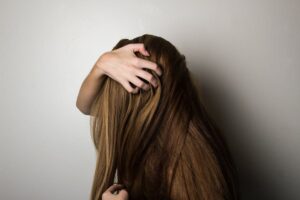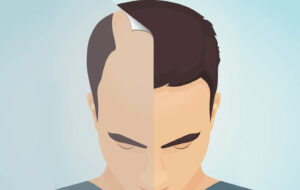Is Facial Hair Loss A Precursor to Balding?

Many people believe that if you suffer from facial hair loss, then there is a good chance that you will also go bald. However, this is not always the case. It seems to be more common in men experiencing male pattern baldness on the top of their heads. But some women can experience it too! This article discusses whether or not these two problems are linked and how they may be related.
What is Hair loss:
Hair loss is a common problem for men and women. If you notice that your beard, mustache, or sideburns are not as full as they used to be – this may mean that you’re suffering from it! It can affect other areas of the face, including the forehead hairline and eyebrow area too. If you have already noticed hair loss on your head, you may be wondering if this problem is linked to the issue.
What Causes Male Pattern Baldness?
Male pattern baldness happens in men whose testosterone levels are high, and they have inherited a specific gene that causes it. It can also occur due to other factors such as illness or poor health and a side-effect of some medications. In the later stages, it can cause hair loss on top of their head too!
What Causes Hair Loss with Facial Hirsutism?
Hair loss with facial hirsutism is a condition that affects men and women where they start to grow excessive amounts of body hair. While it can affect their beard, mustache, and sideburns as male pattern baldness does – the extra hair growth is not always in line with what would be considered normal for men or women! The causes of this issue are still unknown, but there may be a genetic link to it too.
Is It A Precursor to Balding?
Facial hair and balding are two different conditions that can affect both men and women. While they may be linked in some cases, the chances are low. It’s important to remember that you cannot stop male pattern baldness from occurring by avoiding hair loss – it is down to your genetics! If you’re worried about losing your beard or mustache, then there are treatments available for you to consider.
Causes of hair loss:
- Ageing
Hair loss is more common in older people than younger ones. It can happen as part of the aging process, but there are also other reasons why it might be happening for you at this time too!
- Illness or poor health
Hair loss can be a symptom of other issues such as hormonal problems, thyroid disease, and skin conditions. It is important to visit your doctor for advice if you are concerned about it – especially if there are other symptoms that you’re experiencing at the same time!
- Medication
Sometimes, the side effects of medication can be linked to hair loss. Make sure that you read all of the information provided by your doctor or pharmacist to understand any symptoms that could arise – especially if it includes losing facial hair!
- Hormonal changes
The hormones in your body can play a part in hair loss – especially if you suffer from polycystic ovary syndrome, PCOS. If this sounds like something that could be happening to you, make sure you visit your doctor for advice and treatment options!
- Poor diet
A poor or low-protein diet can lead to thinning hair and loss of facial hair too. Ensure you are eating a balanced, nutritious meal plan if this affects your quality of life.
Stress is a common cause of hair loss in both men and women. This can trigger an increase or decrease in your body’s production of the hormone cortisol – which has been linked to issues with hair growth too! So, make sure that you are taking regular breaks from stressful situations if it is causing this problem for you.
Treatment options for Hair loss:
- Shaving
If you’re experiencing thinning hair or loss of facial hair, shaving may be an option for you to consider. However, remember that it is only a temporary solution! If the problem comes back, this won’t be suitable for your needs anymore, so make sure that you explore other options.
- Electrolysis
Electrolysis involves using a fine needle to destroy the hair follicles that are causing this problem for you. It can take several sessions, but it is one of the most effective ways to get rid of unwanted facial hair! This will only work on darker hairs and not grey ones – so if your beard or mustache is going white, it won’t be suitable for you.
- Beard Transplants:
Beard transplants are a surgical treatment option for people who have lost their beard or mustache through male pattern baldness. It works by transplanting the hair follicles from an area still producing facial hair to one which isn’t!
This procedure is a bit expensive, but it is one of the most effective ways to deal with issues with hair loss. The best thing about it is that the transplanted hairs will be permanent!
Before you undergo any treatment options, make sure you’ve spoken to your doctor about them first. They will provide advice and ensure that no other underlying issues are causing this problem for you! Hair loss is a common problem for many men, and it can be distressing too.
However, there are treatments available to you, so don’t suffer alone! If you’re worried about losing your beard or mustache, then there are treatments available for you to consider.
- Ointment:
Six months’ worth of beard ointment can be a great solution. It contains ingredients that block the effects of testosterone and promote regrowth too. You should notice an improvement within six weeks or so!
How long you use the ointment depends on your preferences. However, it is best to apply it three times a day and continue doing so until you’re happy with how much facial hair you have again!
How long do beard transplants last?
Beard transplants are a long-term solution to issues with hair loss. They can be effective for up to five years or so – however, you must continue living your life in the same way after this time has passed too! This means not smoking, maintaining a healthy diet, and practicing good skincare if you want the transplanted hairs to continue looking natural!
In conclusion, hair loss is a common problem, but it doesn’t have to be permanent! If you’re experiencing thinning or a complete lack of facial hairs, then these treatments can help improve your quality of life.






